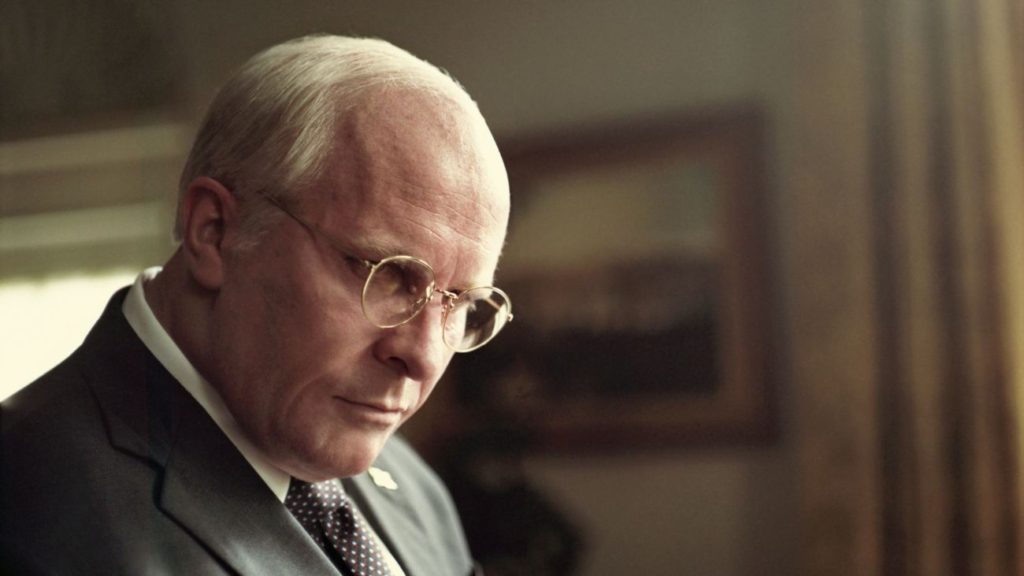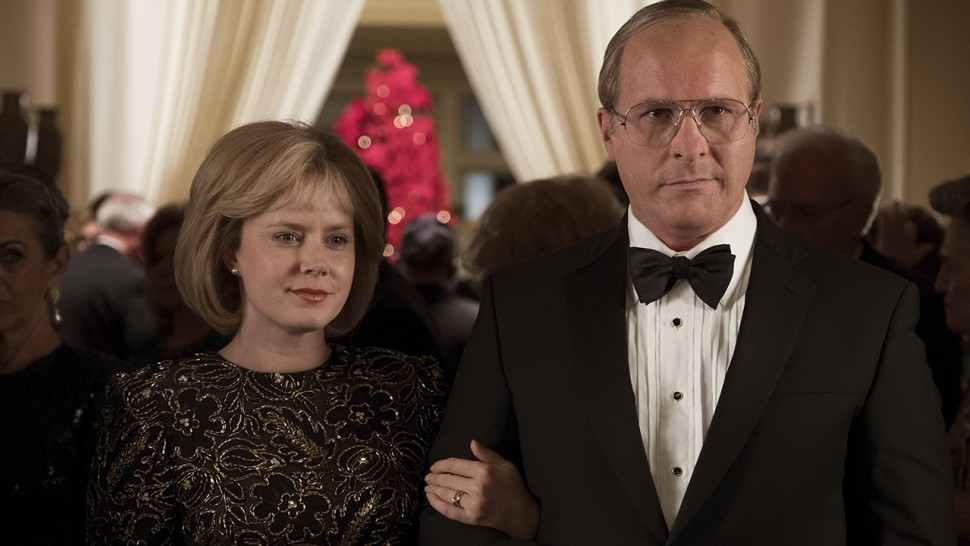Vice (2018)

DIRECTOR: Adam McKay
CAST: Christian Bale, Amy Adams, Steve Carell, Sam Rockwell, Jesse Plemons
REVIEW:
Vice might be billed as a dark comedy, but the occasional absurdist flair only slightly softens the blow of what is essentially a political horror movie. As he did with 2015’s The Big Short—also starring Christian Bale and Steve Carell—Adam McKay uses a comedy-drama approach to bring flair and panache to what on paper sounds like a dry, dull subject for a movie (in The Big Short, the 2007-2008 financial crisis, here the distinctly uncharismatic former Vice President Dick Cheney). In this regard, there’s a little resemblance to what David Fincher/Aaron Sorkin and later Danny Boyle/Aaron Sorkin did with The Social Network—about Facebook founder Mark Zuckerberg—and Steve Jobs—about the late Apple CEO—but suffice to say McKay again puts his own offbeat fingerprints on the proceedings.
Though we jump around in time, we sketch out the life and times of Richard B. “Dick” Cheney (Christian Bale). In 1963 Wyoming, Cheney is a hard-drinking, bar-fighting Yale dropout who seems destined to go nowhere, until his strong-willed girlfriend and wife-to-be Lynne (Amy Adams) hands down an ultimatum: “either you become someone, or I’m gone”. A chastened Cheney promises to never disappoint her again, and for better or worse (usually worse), he keeps that promise. Newly sober and purposeful, Cheney lands in a program for Congressional interns in Washington DC, where he gets taken under the wing of Nixon Chief of Staff Donald Rumsfeld (Steve Carell), who educates Cheney in the ins-and-outs of political maneuvering, an art at which the wet-behind-the-ears Cheney eventually becomes adept. After Nixon’s resignation, Cheney and Rumsfeld get in good with Gerald Ford (Bill Camp), with Rumsfeld becoming Secretary of Defense while Cheney replaces him as Chief of Staff, but Ford losing reelection to Jimmy Carter puts them out of a job. The uncharismatic Cheney’s bid for Wyoming Congressman falls flat, ironically until he’s put out of commission by the first of several heart attacks and is replaced on the campaign trail by his fiercely supportive wife Lynne, who helps propel him to victory. Now installed in the House of Representatives during the Reagan administration, Cheney is ideally-placed to ally himself with conservative lobbying groups, think tanks, and the fossil fuel industries, then becomes Secretary of Defense under George H.W. Bush (John Hillner), where he first makes the passing acquaintance of the President’s unpromising son and, like the younger Cheney, an unreformed drunkard, George W. Bush (Sam Rockwell). Cheney’s consideration of a presidential run is discouraged when he ranks at the bottom of the barrel among prospective candidates, and during the Clinton years, he seems retired from politics, serving as CEO of oil giant Halliburton and living a quiet and peaceful wife with Lynne and their two daughters Liz (Lily Rabe) and Mary (Alison Pill), the latter of whom comes out as a lesbian. But opportunity comes knocking again when George W asks Cheney to be his running mate, and Cheney smells a chance to make it to the White House after all. Despite the Vice Presidency traditionally being a mostly ceremonial position, Cheney finagles an “understanding” with Bush that leaves the running of the government largely in his hands, and from there quickly and quietly sets to work filling the White House and government with more of his own people than Bush’s, assembling a gang of co-conspirators including Scooter Libby (Justin Kirk), Paul Wolfowitz (Eddie Marsan), Cheney’s legal adviser David Addington (Don McManus), and old buddy Rumsfeld. Cheney and his merry band gleefully roll back environmental and business regulations on behalf of wealthy lobbyists and CEOs, circumvent Geneva Convention prohibitions against torture of enemy combatants, set their sights on Iraq as an oil-rich goldmine, manipulate intelligence to draw a flimsy connection between Saddam Hussein and the 9/11 attacks, corner a reluctant Colin Powell (Tyler Perry) into delivering his infamous speech to the United Nations presenting it as fact, and even leak the identity of undercover CIA agent Valerie Plame (remember her?) in retaliation for her husband Joseph Wilson’s op-ed debunking Bush-Cheney claims of weapons of mass destruction. As the movie tells it, Cheney has kept his promise to make something of himself to a proud Lynne. It’s just everyone else who’s paid the price.
That Vice is replete with the trademark McKay irreverence is made obvious from the get-go, when the opening subtitle states that the following story is as true as it can be considering Cheney’s secretiveness “but we did our fucking best”. Perhaps to liven things up for an audience to whom a more straightforward biopic of Dick Cheney would not be riveting viewing, perhaps to slightly soften what feels increasingly like a political horror movie, McKay throws in various touches of absurdist comedy and surreal fantasy scenes, including but not limited to a cameo by Alfred Molina as a waiter reading off a menu of torture methods (“we’ll have it all”, Cheney cheerfully decides), a scene in which Christian Bale and Amy Adams excitedly exchange conspiratorial Shakespearean dialogue (making the Macbethian parallels less-than-subtle), and another oddball moment of fantasy dialogue illustrating Cheney’s powers of persuasion. There’s even a faux ending halfway through, with Cheney seemingly living happily ever after fly-fishing in Wyoming with his golden retrievers, as end credits even begin scrolling, only to be interrupted by the fateful phone call from George W. Bush that gets the politically retired Cheney back into the game in a bigger way than ever (what follows will make many viewers wish that fake-out ending of Cheney walking off into the sunset had been what really happened). There’s also a closing monologue (improvised by Christian Bale) in which Cheney breaks the fourth wall and directly addresses the audience to deliver an angry, defiant speech justifying his actions that’s pretty much the most emotion he displays the whole movie (and, while fictional, seems to mesh up pretty well with Cheney’s attitude in post-White House interviews). There’s lower-key, witty touches as well, such as when Cheney’s conversation manipulating Bush into accepting him as essentially a co-President is intercut with footage of a man reeling in a fish. Oddly enough, the infamous incident of Cheney accidentally shooting a hunting buddy in the face, which one might think McKay would have a field day with, is whisked past and given short shrift. Nor is the movie interested in Cheney’s tenure as CEO of Halliburton, which is mentioned in passing but skimmed over. The biggest quirk is the tongue-in-cheek running narration of a seemingly random bystander (Jesse Plemons), whose mysterious connection to Cheney is finally revealed in an eleventh hour surprise twist. These absurdist touches only marginally cushion the blow, however. Were this fiction telling a story of how a dull, uncharismatic, but quietly conniving bureaucrat slowly but surely clawed his way up the ladder of power, it might have been an entertaining dark comedy. As it is, it’s frequently too disturbing and/or depressing to generate more than uneasy laughter.
As should come as no surprise given McKay’s unabashed opinionated liberal leanings (and frankly many of the facts onhand) Vice by and large does not paint a positive picture of Dick Cheney (the “Vice” in the title has an unsubtle double meaning). Cheney is not made into a cartoonish villain, and he is allowed some small human moments—he genuinely loves his wife and daughters—but the picture overall is of a cold, calculating Machiavellian figure who, the movie argues, has both directly and indirectly dealt lasting damage to the state of politics and to the nation. At least for a while, Cheney’s relationship with his openly lesbian daughter Mary gives a flicker of hope that his soul might not be completely rotted away—his response to her coming out is loving acceptance—but even this is eventually compromised when he gives his other daughter Liz, running for political office and getting flack from her opponent for fence-sitting on gay rights, the green light to take a definitive stance against it, an act which permanently estranges the two sisters. Nor is the movie sympathetic to Cheney’s longtime partner-in-crime Donald Rumsfeld (though, like Mary, eventually even old buddy Donnie gets thrown under the bus), or to the sycophantic likes of Paul Wolfowitz, Scooter Libby, and David Addington, who eagerly aid and abet Cheney’s power-mongering agendas. It’s hard to imagine many of the people portrayed in this movie enjoying the versions of themselves that appear onscreen.
McKay’s reach sometimes exceeds his grasp, trying to cover Cheney’s life and times and the rise of propagandistic conservative media like Fox News; we get a cameo by Fox founder Roger Ailes (Kyle S. More), and periodic pop-ups by Naomi Watts as a nameless Fox News anchor who occasionally breaks the fourth wall to directly narrate the action. When reuniting with Rumsfeld in the Bush White House, Cheney urges a softer touch; “we’ve got the radio and television to do our yelling for us”, he explains. McKay stretches in his thesis that Cheney helped pave the way for the Trump administration—we get archive footage “cameos” of Jeff Sessions and Mike Pence voting in favor of Bush-Cheney environmental and business deregulation, and a blink-and-you’ll-miss-it glimpse of Trump himself—and especially in a closing montage of school shootings, drug overdoses, and wildfires, as if trying to flimsily loosely tie Cheney to every recent bad thing that’s happening in the US (as if the movie isn’t partisan enough by this point, it chucks in an ultra meta mid-credits stinger of a Hillary Clinton supporter and a Trump supporter wrestling on the floor after a focus group viewing of the movie). On these occasions, McKay tries to do too much and his connections are as tenuous as the ones Cheney and company used to get us into Iraq.

While the makeup team deserves some of the credit, Christian Bale lives up to his reputation as a chameleonic method actor by submerging himself in his part. In Cheney’s younger scenes, Bale is recognizable, but that’s not the case in older age, when, like Gary Oldman’s Winston Churchill in last year’s Darkest Hour, we’re watching Dick Cheney, not Christian Bale as we know him (and unlike Oldman, Bale dispensed with a fat suit or padding and gained forty pounds). He is solidly offset by Amy Adams as Cheney’s Lady Macbeth-esque wife, without whom, the movie argues, Dick would never have gotten anywhere (that Bale and Adams play well off each other is not surprising considering this is the third time they’ve co-starred, after The Fighter and American Hustle). Alas, the same effect is not achieved by either Steve Carell’s over-the-top, cartoonish Donald Rumsfeld, nor by Sam Rockwell’s disappointingly unconvincing “Dubya”, who doesn’t look or sound much like the real thing, not enough for us to see “George W. Bush” instead of “Sam Rockwell” (the opposite effect of Bale as Cheney). There’s a boatload of walk-on roles as people most of us will at least vaguely remember from the Bush-Cheney years, including Tyler Perry adequately playing it straight as Colin Powell, LisaGay Hamilton as Condoleezza Rice (who looks the part but doesn’t get much screentime), Eddie Marsan’s Paul Wolfowitz, Justin Kirk’s Scooter Libby, Jillian Armenante’s Karen Hughes, and Joseph Beck’s Karl Rove, along with “spot that famous political figure!” cameos by Antonin Scalia (Matthew Jacobs), Henry Kissinger (Kirk Bovill), Gerald Ford (Bill Camp), Roger Ailes (Kyle S. More), and Trent Lott (Paul Perri).
Ultimately, Vice is fascinating/disturbing in the way of something like Michael Moore’s documentary Fahrenheit 9/11—covering some of the same subject matter—and is likewise preaching to the choir and tossing red meat to its target audience. Those who are not political junkies or interested in a movie about the already oft-discussed misdeeds of Dick Cheney are unlikely to be converted, but for those to whom the subject matter appeals—you probably know who you are—Vice is a morbidly engrossing revisit down memory lane to possibly the most powerful and most controversial Vice President in American history
* * *